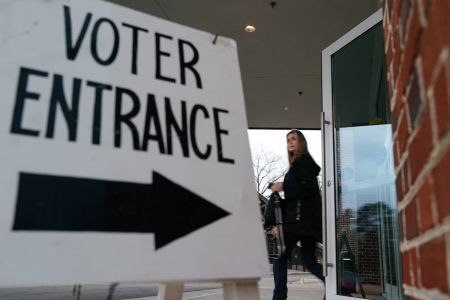Trump, Biden win most Super Tuesday contests as Haley secures an upset

President Joe Biden and former President Donald Trump won the overwhelming majority of their respective Super Tuesday presidential primaries as former South Carolina Republican Gov. Nikki Haley and a little-known Democratic candidate secured one victory each.
Fifteen states held Republican presidential primaries or caucuses on Tuesday, while 16 states and territories held Democrat presidential primaries or caucuses to select their preferred candidates for the Republican and Democrat nominations for president.
More than a month into the Republican presidential primaries and caucuses, only two major candidates remain: Trump and Haley.
Trump won nearly all Republican contests Tuesday night and secured an overwhelming lead in the delegate count.
Nearly 900 delegates were up for grabs on so-called "Super Tuesday."
The lone Super Tuesday primary Trump lost was Vermont, where he failed to secure any of the state's 17 delegates. Meanwhile, in the Democratic presidential primaries, frontrunner Biden won all but one contest: the American Samoa Territorial Caucus.
While American Samoa does not vote in presidential elections, its voters have a say in who receives the Democratic presidential nomination. Little-known candidate Jason Palmer captured 56.04% of the vote to Biden's 43.96%.
Addressing his supporters in a speech Tuesday night, Trump remarked, "They call it Super Tuesday for a reason."
"They tell me, the pundits and otherwise, that there's never been one like this; there's never been anything so conclusive," Trump said. "This was … an amazing night, an amazing day."
The former president went on to lament the current state of the U.S., reflect on his presidency and outline his vision for a second term.
In California, Trump won all 169 delegates after securing a commanding lead over Haley after the polls closed.
In Texas, Trump won nearly all of the 161 delegates after beating Haley by more than 60 percentage points.
North Carolina, home to 75 delegates, gave Trump approximately 73.8% of the vote. He finished more than 50 percentage points ahead of Haley. Unofficial results, with 99% of the expected vote in, show Haley projected to carry 11 delegates from the state even as Trump is on track to walk away with 64 of them.
Tennessee awarded all 58 of its delegates to Trump, who won about 77.3% of the vote there. He finished far ahead of Haley, who secured just 19.5%.
Trump has won all 50 delegates in the state of Alabama. Unofficial results show the former president capturing 83.2% of the vote while Haley is in a distant second at 13%.
In Virginia, Trump will walk away with most of the state's 48 delegates after beating Haley 63.1% to 34.9%. Haley secured at least six delegates after winning two congressional districts in the northern part of the state that includes the Washington, D.C. suburbs.
In Oklahoma, Trump won all 43 of the state's delegates after capturing approximately 81.9% of the vote to Haley's 15.9%. Trump also walked away with all 40 delegates in Massachusetts, where he won 59.6% to Haley's 37.4%.
In Arkansas, Trump secured 39 of the state's 40 delegates. Unofficial results show him winning 76.7% of the vote to Haley's 18.5%.
Minnesota, home to 39 delegates, gave Trump 68.8% of the vote, while Haley received 29.2%. In Colorado, Trump has won most of the state's 37 delegates after beating Haley, securing approximately 63.3% of the vote to her 33.4%.
Trump won all 20 delegates in Maine, where unofficial results show him beating Haley with more than 72% of the vote.
Trump won 87.6% of the vote in Alaska, home to 29 delegates. With 83% of the vote counted as of late Monday morning, Trump won over 57% of the vote in Utah, home to 40 delegates.
Unofficial results in Vermont show Haley capturing 50.3% of the vote to Trump's 45.8%. Haley's victory in Vermont marks the second Republican primary she has won. She also won the primary in the District of Columbia over the weekend, securing all 19 delegates.
Haley's campaign released a statement shared by CNN reacting to the results.
"We're honored to have received the support of millions of Americans across the country today, including in Vermont where Nikki became the first Republican woman to win two presidential primary contests," the statement read.
"Today, in state after state, there remains a large bloc of Republican primary voters who are expressing deep concerns about Donald Trump," the statement added. "That is not the unity our party needs for success. Addressing those voters' concerns will make the Republican Party and America better."
In the Democratic primaries, unofficial results show Biden won more than 90% of the vote in California, Iowa, Maine and Tennessee. He captured more than 80% of the vote in Alabama, Arkansas, Colorado, Massachusetts, North Carolina, Texas, Virginia and Utah.
In Minnesota and Oklahoma, he secured more than 70% of the vote.
Rep. Dean Phillips, D-Minn., the only prominent challenger to Biden, finished in third place or worse in every state he was on the ballot except for Maine, where he was the only other candidate besides the president on the ballot. In all other states, he finished behind voters who were "uncommitted" to a particular candidate or Marianne Williamson, who has since dropped out of the race.
As is the case with all other Democratic presidential primaries and caucuses, delegates are awarded on a proportional basis based on a candidate's share of the statewide vote. Both Palmer and Biden will receive three delegates from American Samoa, meaning that the contest is the only one that has taken place so far where Biden will not walk away with a majority of delegates.
Ryan Foley is a reporter for The Christian Post. He can be reached at: ryan.foley@christianpost.com





















